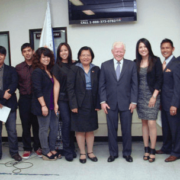The art of diplomacy is a blend of fact, fiction and poetry, with its peculiar commerce of hints and harmonious overtures.
Like life, it is about the important, the unimportant, the tragic, the smug, the amusing and the humane.
In a wealth of light-hearted knowledge about how the foreign services actually work (from a cloistered Embassy, to summit meetings on the problems and opportunities of international life, through a fund of anecdotes and quotations to back it up) lies a persuasive message: truth, accuracy, calmness, patience, good temper, modesty and loyalty, intelligence, discernment, prudence, hospitality, charm, industry, courage and tact.
These are the qualities expected of an ideal diplomat.
Splendid requirements or insufferable arrogance?
The public image of diplomats (particularly reflected in the media) could be strangely confusing at times — their life and work, their skills and abilities, flaws and vulnerability and their wit.
How do they ever deal between posturings of the politically-committed, to find a middle course into the well-oiled mechanism of international relations and its complexities? Of negotiations and political assessments?
In the January 4, 1945 issue of the New York Times Francis Hackett wrote: “In a diplomats soul…you’ll find the blubber of charity, the whole bone of flexibility, the oil of commodity. A great diplomat is a regular Moby Dick.”
Simon Jenkins, the former editor of the Times once suggested, that an ambassador was “just a double-breasted smile, a fox in spats, an up market Jeeves to the expatriate great and good.”
At one level, diplomats are mocked as upper-class twists, sent as the old joke: “has it cloaked in secrecy to lie abroad for the country, amusing or be missing (foreigners) of their host country, even as they revel in their diplomatic immunity.”
At a more informed level, since embassies and diplomats who staff them are now and then (if not constantly) in the news, the conception of what diplomatic life is all about is gradually becoming a little more realistic, though they still get regular doses of criticism.
Sir Charles Powell’s review of a book of diplomatic anecdotes wrote at the Times: “The truth is, that much of diplomatic life is unremarkable, except that it is conducted abroad.”
Winston Churchill defined it as “a mix of protocol, Geritol and alcohol.” Nothing could be more potent.
The diplomats’ endeavors to represent the interests of their homeland, in the country which they are accredited, are ruefully often disparaged and dismissed along the lines of Lord Byron from his epic Don Juan: “but speakers, bards, diplomatists (which is no longer used these days) and dancers, Little that’s great, but much of what is clever.”
In Henry Kissinger’s Diplomacy, he mentioned of practicing “a convenient form of ethical egotism…”
Yet, some of the lighter books on diplomacy are more entertaining and have amusing aspects (including the trivials of diplomacy) when helped by fiction and a bit of humor, if not a refusal to take the subject too seriously.
Some rules and recipes could be, after all, made for disaster — when the ingredients and diplomatic trivia get in the way of the taste of reality.
I have always opted for flavor, not the recipe.







